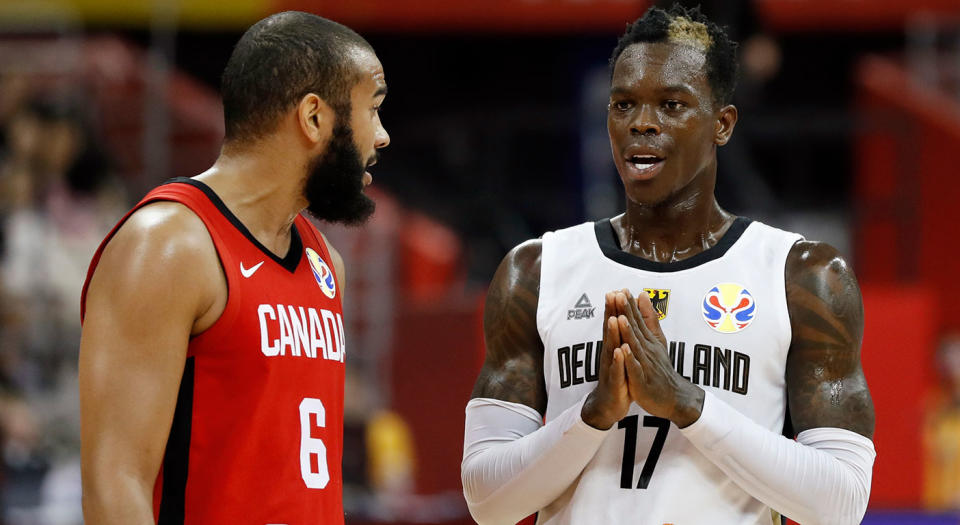Canada ends underwhelming FIBA World Cup run with loss to Germany

Germany defeated Canada 82-76 in the final classification game but the red and white were still able to secure entry into next summer’s Olympic qualifying tournament for Tokyo 2020.
Canada held a 12-point lead in the third, but could not find a solution for Dennis Schroder, who finished with 21 points, 10 rebounds and nine assists. The Canadians generally outplayed the Germans, but shot just 9-of-39 from deep following a record-setting 24 triple effort against Jordan two nights prior.
The loss means Canada finished 21st at the FIBA World Cup, a seeding that will make their final shot at qualifying all the more difficult. It will be an uphill battle to cobble together enough talent to compete in what will be an extremely crowded field, but the dream for Canada’s first Olympic men’s basketball appearance in two decades does remain intact.
Here are three takeaways from the loss:
Make or miss
It’s hard to fault the Canadians for this loss, as they played perhaps their best game of the tournament only to fall into a deep shooting slump. Canada repeatedly broke down the German defence to create open looks from the 3-point arc, but their otherwise reliable shooters just couldn’t connect.
Fresh off a 29-point masterclass against the Jordanians, Wiltjer suddenly couldn’t buy a basket. Save for a pair of back-to-back corner threes in the third quarter, Wiltjer hit 1-of-12 from deep despite being left open time after time. Wiltjer had been Canada’s most explosive scorer throughout the tournament, and should remain with the program as a bench option in the future.
Wiltjer’s off night also happened to coincide with a complete dud from Kevin Pangos, as he was shut out with 0-for-8 shooting from the field while missing all five of his three-point attempts. Pangos was Canada’s best player in the warm-up games, but for one reason or another, has failed to translate that same success in the actual World Cup itself. Perhaps the reintroduction of Cory Joseph threw him off, but Pangos was just not as effective when it mattered most.
Nevertheless, it was the right approach from Canada to prioritize the three-point shot. As constructed, the lone strength of this Canadian roster was shooting, and with that, off-nights come as part of the territory. If anything, Canada should have taken this high-risk approach against Lithuania and Australia in the group stage, as a hot streak might have led to an upset and an entirely different outlook on the tournament.
Who’s the man?
Even despite the poor shooting performance, Canada still had a prime opportunity to close out strong as the game was tied with three minutes remaining. However, Germany had the luxury of playing through Schroder every time down the floor, while it was apparent that Canada lacked anything close to a closer.
Schroder played with a confidence and poise that kept the German offense humming right until the end. Schroder slithered through the defense and consistently drew extra defenders, which set up dagger threes from his teammates. Nobody on the Canadian side could contain him one-on-one, and so the defense was always scrambling to help and recover. Schroder set up two threes, got to the line for two free throws, made a gorgeous reverse layup, and goaded Joseph into an offensive foul in the closing moments to secure the result.
On the other end, there was no certainty as to who would assume responsibility for the Canadians. Joseph did his best to steer the ship, but he’s not nearly as dynamic of a playmaker as compared to Schroder. Wiljter was still the best scoring option, but he can’t create his own offense, and the Germans smartly dialed up the pressure to deny Wiltjer’s looks. Pangos would have been third on the pecking order, but he also happened to be having one of the worst games of his career.
Again, this is where the absences hurt for Canada, because someone like Jamal Murray or Andrew Wiggins would close in an ideal world. In late game scenarios, you just need someone who could get you a bucket, and Canada just didn’t have enough talent at this tournament to fill that role.
Promising future
The two bright spots from this game were Khem Birch and Andrew Nembhard, who both submitted their best efforts of the tournament.
Birch has been steady throughout, but he was nothing short of dominant on Monday. He single-handedly changed the game in the third quarter with an inspired run in which he finished an and-one despite an unsportsmanlike foul on the play, met Schroder at the rim for a spectacular block, snagged multiple offensive rebounds on the same possession, and then sparked a fast break with a give-and-go sequence that resulted in a highlight dunk. His energy opened a 12-point advantage for the Canadians, but the bench couldn’t maintain that momentum after Birch checked out. He finished with 15 points and nine rebounds in the loss.
Nembhard, on the other hand, struggled mightily until today’s game. The 19-year-old seemed intimidated by the bright lights, and he was dropped from the rotation altogether despite being a key figure in the tune-up games. However, the Florida Gator finally had it all together against Germany, as he went toe-to-toe with Schroder in the second quarter to help Canada build a lead. After one of Schroder’s baskets, Nembhard showed no fear as he immediately sought out Schroder on a post-up before swishing a turnaround jumper in his eye. It’s that type of confidence and ability that will see Nembhard through to the NBA in the coming years. Nembhard finished with six points and four assists.
More basketball coverage from Yahoo Sports

 Yahoo Sports
Yahoo Sports 
